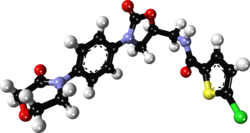Rivaroxaban
 |
|
 |
|
| Clinical data | |
|---|---|
| Trade names | Xarelto, others |
| AHFS/Drugs.com | Micromedex Detailed Consumer Information |
| License data |
|
| Pregnancy category |
|
| Routes of administration |
By mouth |
| ATC code | |
| Legal status | |
| Legal status | |
| Pharmacokinetic data | |
| Bioavailability | 80% to 100%; Cmax = 2 – 4 hours (10 mg oral) |
| Metabolism | CYP3A4 , CYP2J2 and CYP-independent mechanisms |
| Biological half-life | 5 – 9 hours in healthy subjects aged 20 to 45 |
| Excretion | 2/3 metabolized in liver and 1/3 eliminated unchanged |
| Identifiers | |
|
|
| Synonyms | BAY 59-7939 |
| CAS Number | |
| PubChem CID | |
| IUPHAR/BPS | |
| DrugBank | |
| ChemSpider | |
| UNII | |
| KEGG | |
| ChEMBL | |
| ECHA InfoCard | 100.210.589 |
| Chemical and physical data | |
| Formula | C19H18ClN3O5S |
| Molar mass | 435.882 g/mol |
| 3D model (Jmol) | |
|
|
|
|
|
|
|
Rivaroxaban, sold under the brand name Xarelto among others, is a blood thinner which is taken by mouth. It was initially developed by Bayer. In the United States, it is marketed by Janssen Pharmaceutica. It is the first available active direct factor Xa inhibitor which is taken by mouth. The maximum inhibition of factor Xa occurs four hours after a dose. The effects last approximately 8–12 hours, but factor Xa activity does not return to normal within 24 hours, so once-daily dosing is possible.
In those with non-valvular atrial fibrillation it appears to be as effective as warfarin in preventing nonhemorrhagic strokes and embolic events. Rivaroxaban is associated with lower rates of serious and fatal bleeding events than warfarin though rivaroxaban is associated with higher rates of bleeding in the gastrointestinal tract.
In July 2012, the UK´s National Institute for Health and Clinical Excellence recommended rivaroxaban to prevent and treat venous thromboembolism.
The most serious adverse effect is bleeding, including severe internal bleeding. Rivaroxaban is associated with lower rates of serious and fatal bleeding events than warfarin but is associated with higher rates of bleeding in the gastrointestinal tract.There is currently no antidote for rivaroxaban (unlike warfarin, the action of which can be reversed with vitamin K or prothrombin complex concentrate), meaning that serious bleeding may be difficult to manage.
In October 2014, Portola Pharmaceuticals completed Phase I and II clinical trials for andexanet alfa as an antidote for Factor Xa inhibitors with few adverse effects, and started Phase III trials. Andexanet alfa was expected to be approved in 2016.As of 2017[update], the compound has yet to be approved by the U.S. Food and Drug Administration.
...
Wikipedia
